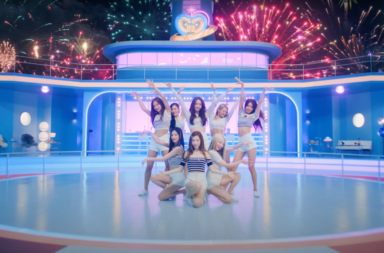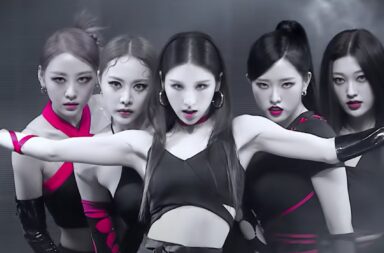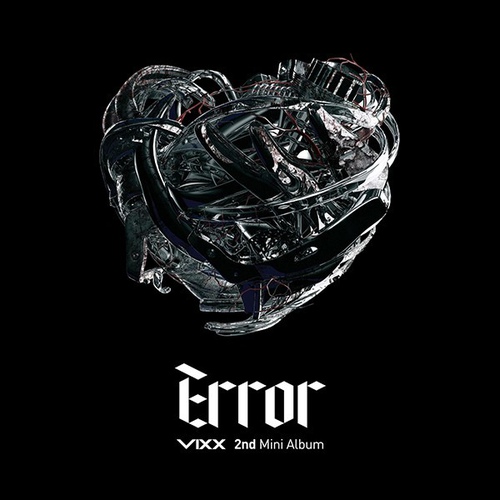
As far as album covers go, VIXX‘s Error mini album has a rather austere one: a mass of metal bent into the shape of a heart, set against a solid black background. But as with many things in K-pop, there is more than meets the eye, for those willing to take a closer look. From afar, the heart looks neat, its edges curved rather than angular. Close up, it’s a messy tangle of silver strips and wires, a picture of mechanical decay. Yet a loop of red wire–almost like a blood vessel–is threaded through the top, giving this artificial heart a strange, delicate sense of life.
Much like its cover image, Error, released six years ago on 14 October, is chaotic, but incredibly evocative. It’s somewhat sonically incoherent, and the transitions between the tracks—with the notable exception of the intro and title track—leave much to be desired. These pitfalls weren’t always typical of the time; the Wonder Girls‘ Reboot and BTS‘ The Most Beautiful Moment in Life Part 1 and Part 2, which were also released in 2015, come to mind as incredibly cohesive sound-wise, with natural progressions from track to track.
Yet Error holds its own, packing an emotional punch with thoughtful arrangements that foreground the group’s vocals. It not only showcases echoes of VIXX’s past styles and previews sounds they would later dip into, but also stands as a lodestone of the dance ballad genre that was favoured by early 2010s K-pop. Ultimately, it achieves a balance between being of its time and ageing well, proving to be just as mesmerising six years after I first laid ears on it.

Right from the start, Error folds the listener into the dystopian, sci-fi mood of the album’s concept. “Steel Heart” opens with a series of whirs and a gentle clacking: you are being transported through a space tunnel, to the core of the cyborg lab featured in the “Error” MV. Melancholic dubstep fills the silence, quickly building to a grittier variation on “Error”‘s instrumental, underpinned by shuddering synths. The drama falls away all of a sudden; strain your ears a little, and you might just hear heavy exhales that find their sonic counterpart in the weary exhale that “Error”, the second and titular track, begins with.
It’s not very often that a K-pop intro track is as effective as “Steel Heart”. It not only sets the tone for the rest of the album, especially for “Error”, but also introduces key sonic motifs. The stuttering, heavily warped synth is a preview of similar distorted sounds that appear in the background of “After Dark”‘s verses and chorus and run through “What U Waiting For”. The rhythmic beat of “Steel Heart”‘s dubstep and synth layers also establishes the mid-tempo nature of the album, which even the more upbeat tracks like “Time Machine” shares.
Even though the tracks are mostly mid-tempo, they don’t lack in emotional impact. Much of this is thanks to a production choice that is sorely lacking in many K-pop songs today: the decision to focus on the vocals and melodies. In recent years, one too many producers have opted to showcase the instrumentals of pop songs, crafting virtuosic drops and breakdowns relegating vocal melodies to the far background of choruses, or even replace them with a series of chants (think, for instance, of how the chorus of BTS’ “Fire” is just a repeated chant of one word).
This drop-instrumental-centred approach can work well at times, but “Error” is solid proof of the emotional richness that the more conventional approach of favouring melodies and vocals can yield. It opens with a weary sigh and a plaintive piano instrumental that accentuate the resignation in Leo‘s verse:
[I] couldn’t do anything about it, [I] threw [it] away
[I] erased all emotion
[I] tried but couldn’t erase you (let me free)
Because I felt sorry (let me breathe)
The use of harmonisations in Hyuk‘s “let me free” and “let me breathe” lend these lines a haunted air. Unable to hold on to their lover, but also unable to fully let go, the persona of the song has resigned themselves to living in a state of detachment:
[I] just need to live like this, to breathe
To be nothing more than just alive, why not
Their heart is pumping rhythmically like the beat that enters with N‘s verse, signalling they are alive, but are not emotionally present. This is conveyed by N’s listless delivery and a point move where the VIXX members plug their hands into his back, as though they are sending electricity charges to force some life into him.
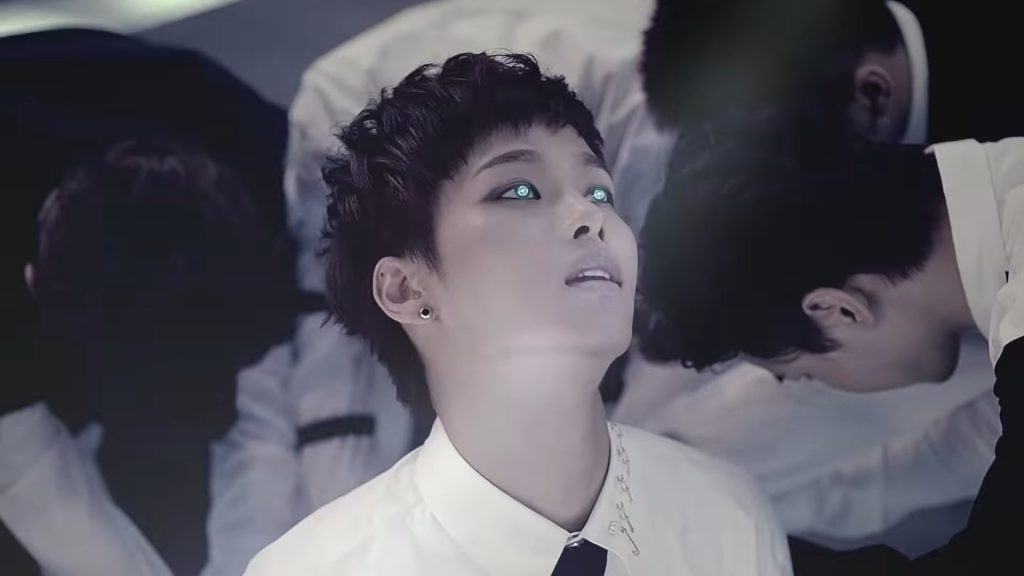
In light of this theme, the cyborg concept of the track makes sense; the persona breathes and moves, but is missing something that makes them fundamentally human. The cyborg concept doesn’t just remain at the visual level; it is also expressed musically, such as by the filtering of Hongbin‘s voice to make it sound robotic in the build-up to the chorus. As the persona confronts their surging emotions, these sonic distortions fall away, allowing the voices of Leo and Ken to rush forth with a startling honesty:
[I] don’t want to let go of myself
[I] don’t want to ruin myself further
Memories that won’t end even when they are over
[I] have no confidence in overcoming them
The layers of the song are simple yet purposeful. From the beat that pulses like a heart, to the jarring DJ scratches that encroach on the melody when the persona admits that they are beginning to forget their lover, every instrumental element is orchestrated to support the vocals, and the emotional nuances that the vocals express. The instrumentals are hollow and distorted when VIXX sing of detachment; insistent and emotive when the persona faces their true feelings; and pared down in moments of vulnerability, such as when N pleads, “Don’t ever forget me.”
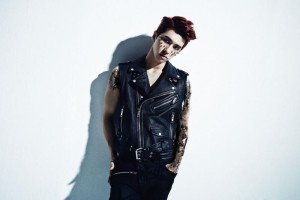
The attention to instrumentals in service of the melody and lyrical content carries over to other tracks in the album. Distorted vocals and a menacing dubstep dramatise the emotional turmoil of “After Dark”, which expresses the fear of a persona whose love is not reciprocated. Ravi-composed track “What U Waiting For” is driven by a buzzing instrumental that contrasts with seductive falsettos: VIXX are bad boys, as the abrasive instrumental suggests, and the song is their siren call, luring their love interest in with the promise of being their destiny. “Youth Hurts”, a meditation on the heartbreak colouring the persona’s experience of adolescence, features a simple, pensive piano and drumset instrumental. The lightness of the song gives a wistful mood to suit the lyrics.
Although “Youth Hurts” shares a similar melody-centred approach to production, and is a great track on its own, it sticks out—together with the upbeat “Time Machine”—as odd choices for the album. The cheerful millennial whoop in the post-chorus of “Time Machine” is especially incongruous with the mostly dark, dramatic sound of Error. If not swapped out, these tracks could at least have benefited from a better place within the tracklist, instead of being sandwiched between the more sonically compatible “After Dark” and “What U Waiting For”. It’s almost as if, in a late night staff meeting amidst the chaos of preparing for the comeback, someone sat up and said, “Hold it—we can’t end off this dark cyborg album with a hopeful track, how about we move the cheery songs to the middle?” and everyone else was too sleep-deprived to disagree.
Nonetheless, the buoyant sound of “Time Machine” recalls previous VIXX songs like “G.R.U.8” (from 2013’s Jekyll), much like how the rumbling dubstep of “After Dark” is reminiscent of “Hyde“‘s frantic electronic runs. And the album’s centrepiece, “Error”, stands as the culmination of three consecutive musical and conceptual successes for the group, over a span of less than two years.
After debuting with a peppy electro-pop sound and an accompanying bright image (“Super Hero” and “Rock Ur Body“), VIXX began to find their conceptual and musical groove with 2013’s “On and On“, an edgy dance pop number that depicts the group as (very attractive) space zombies. Each subsequent release became darker and more daring. “Hyde”, with its skittering, helter-skelter synths and pinched vocal delivery, tells the tale of an infatuated man with a dual personality. “Voodoo Doll”, with its assured mid-tempo bass and soaring vocals, speaks of a persona boldly surrendering himself to be used by his lover for whatever purpose that suits them. “Eternity” takes the melodic quality of “Voodoo Doll” to new heights, opting for an EDM bassline, wistful vocals, and breathy falsettos that sing about a love that persists across time.
The dance ballad sound of “Eternity” proved to be a perfect fit for VIXX’s affinity for dances with narrative elements and their expansive vocals. Rarely defined as a genre, the dance ballad—which meshes dance pop with ballads—could very well be unique to K-pop and is likely the product of the desire to showcase choreography and vocal skills in equal measure. “Eternity” and “Error” follow in the footsteps of tracks like BEAST‘s “Fiction” and “Good Luck“, and BtoB‘s “Insane” and “Irresistible Lips“, to create a soundscape that’s theatrical and stirring, but also pulsing with an energy that suits the K-pop stage.
“Error” combines this newfound niche with other strengths the previous title tracks uncovered: a propulsive mid-tempo beat, purposeful use of synths and instrumentals to bring out the song’s core emotion, vocal-centred verses that climb to a soaring chorus, and emotive vocal runs and melancholic harmonisations. This combination elevated “Error” from song to experience, sending the listener into its dystopic, cyborg Romeo and Juliet story-world for its four-minute run.
The awkward transitions and lack of musical cohesion of the Error EP would later be attentuated in Chained Up (whose groovy, seductive sound is hinted at in “After Dark”) and 2018’s Eau De VIXX. But with the eponymous “Error” at its helm, the album remains unparalleled in its sheer emotional force. It may not be the most sophisticated or polished album that 2015 K-pop had to offer, but like its better peers, it truly stands the test of time.
(YouTube. Images via Jellyfish Entertainment. Lyrics via Bugs and YouTube.)
